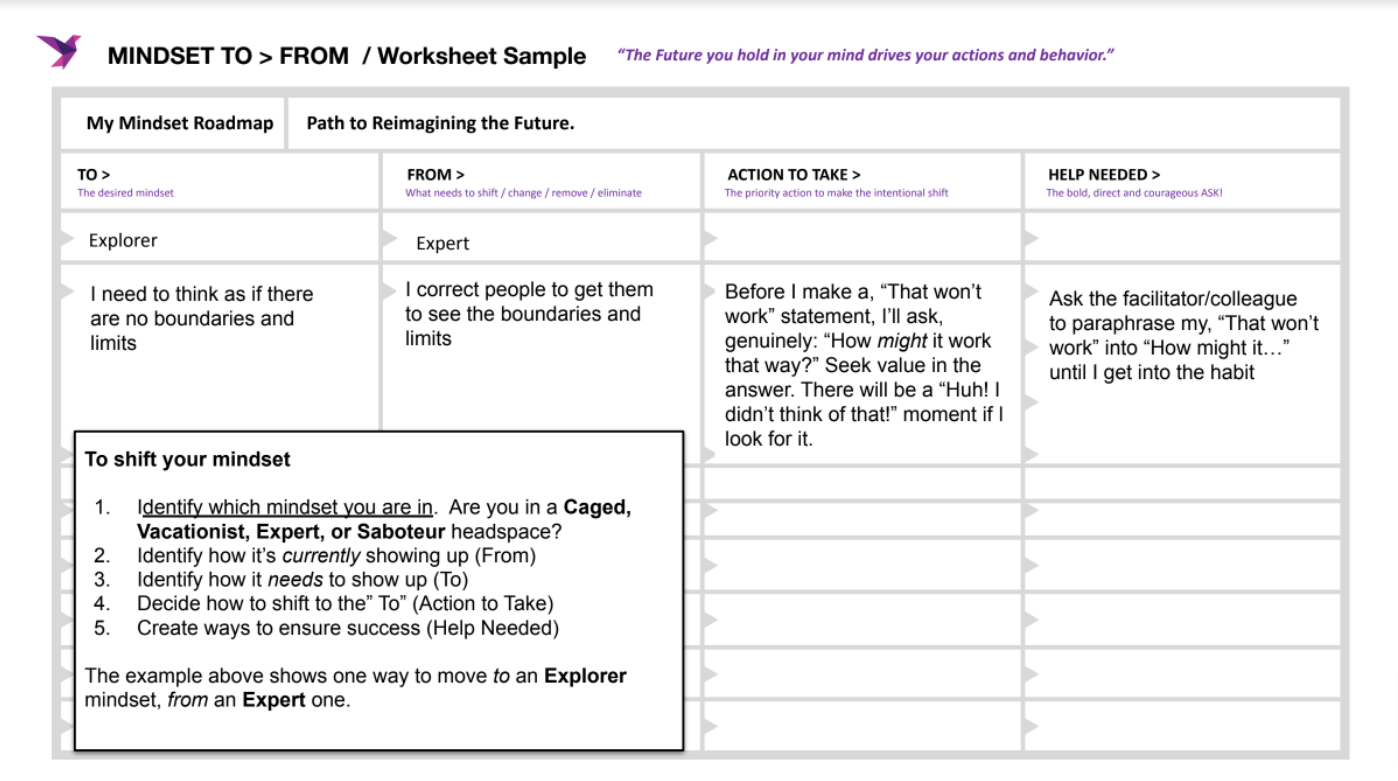In a meeting recently, the team at Be Courageous reminisced about a time before we knew what it meant to “Google” something. Before we knew what Bitcoin was. Before we had discovered air frying! Imagine what “air frying” must have sounded like to the mindset of someone in the 1970s!
We live in a world where exponential technologies make almost anything possible. But while we’d all agree the world changes quickly (think of our grandparents who watched cars and planes happen!), it can still be challenging to embody an “everything is possible” mindset consistently.
As much as humans are dreamers and visionaries, we also crave “the known.” We crave the security and comfort of clear labels and linear thinking. It is how we make sense of our world. But what if the world is changing, or you want to change it?
Why mindsets are important
A person’s mindset describes where their headspace is most of the time. It’s the default filter for a person’s perception of the world. Your life and business will go where your mind leads it.
You’ve probably heard the Buddha saying, “What you think, you become. What you feel, you attract. What you imagine, you create.” Not just momentarily when you’re feeling inspired or intrigued, but every day. Even when it’s time to do the hard work of implementing your big idea(s). Even when you’re exhausted, even when you might face financial challenges or face resistance from those around you.
In our experience working with thousands of executives, as well as technology and innovation teams around the world, we’ve found mindsets usually come down to five types.
Being able to identify default thinking patterns in yourself and others, and understanding why we have them can help you shift your thinking to a mindset better suited for the task at hand.
Five mindsets that can make (or break) your next breakthrough
1. The Caged
A person in a caged mindset feels trapped or stuck, whether they’ve put themselves there or have previously been in toxic environments not welcoming to their ideas and expression.
The caged mindset has zero desire to participate. They often exhibit a victim mentality and a grumpy-to -hostile response mechanism. They zap energy from the room, which pulls everyone down with them.
A caged mindset can stem from:
- The pressure of day-to-day operations.
- The involuntary nature of being in a situation.
- A lack of clarity about what the situation is, and what’s to be gained by spending time on it.
To shift out of this mindset, accept.
Accept this is the meeting you’re in. Accept this is the project you’re on. Realize, you have a lot to add to the conversation, otherwise you wouldn’t have been invited. Invite curiosity. Breath in, breath out, and bring your brilliance.
2. The Vacationist
A vacationist is there for the free food and fun! They’re the ones usually found, not at the whiteboard coming up with solutions, but at the ping-pong table. Vacationists are fun in meetings and offer levity, but rarely offer substance.
A vacationist mindset can stem from:
- Needing a break from day-to-day stress.
- Avoiding deeply caring about the issue at hand, out of fear.
- Relying on this mindset because it’s worked in the past.
- Not having confidence in expertise on the subject/task at hand.
To shift out of this mindset, remind yourself.
Remind yourself that you have value to bring. If you’re not the expert in the room, your ability to think freely may be the reason you’ve been invited. Others want your perspective. Your input is critically valuable to the team. You don’t need to hide behind the vacationist. Try to come halfway from the dreamy place you are in now to the present.
3. The Expert
An expert is a wonderful thing, and a gift to the world. Experts have spent enormous time and energy on deeply knowing a subject that enables our current world to function. The only problem that can arise in an expert mindset is ego. In a discussion, the expert’s motivation is to prove their knowledge, rather than trying to move a project forward.
An expert mindset can stem from:
- A truly deep current domain expertise, which is difficult to think outside of.
- A lot of water under the bridge, watching new things try and fail.
- The need to be a gatekeeper and risk mitigator.
- Being “The Expert” has served you well in the past.
To shift out of this mindset, read the room.
How are your interjections of “expertise” landing? If your comments are decreasing the effectiveness of the meeting, you might have missed the purpose. Seek clarity. Maybe this part of the meeting is about exploring, about trying to see a different future, one that challenges current conventions.
Expertise sharing in a creative problem solving initiative should come at the end, when it is time to turn new thinking into reality. That is the time for your wisdom, and thank goodness you’re here!
4. The Saboteur
A person living in a saboteur mindset does everything in their power to make sure others’ ideas, solutions and work don’t see the light of day. It’s one of the most insidious and difficult mindsets to overcome.
A saboteur mindset can stem from:
- The inability to see personal success in a project’s success.
- Fear someone else will receive sought-after recognition.
- Being caught in a revenge cycle with the person leading an initiative.
To shift out of this mindset, check yourself.
Assume positive intent from your teammates. Think about what’s good for the team rather than (potentially, but not likely with this mindset) success just for you. Find the ground where there is enough light for all to shine.
The biggest challenge with a saboteur mindset is the intent to do damage.
If you have a saboteur on your team, be careful. They’re not aligned with the success of the project. They can be highly manipulative, and very subtle in the damage they do.
And if you’re the saboteur, destroying initiatives and teamwork with a big Cheshire-cat smile? Get help, this is a much bigger problem than work, and it will catch up to you. It’s imperative you refocus your energy towards creating your success, without damaging someone else.
5. The Explorer
The explorer is open-minded and curious. They ask questions that they don’t know the answer to. The explorer doesn’t accept the status quo. They ask, “Why?”
Explorers are clearly on the journey with you. This doesn’t mean agreement all the time. But they’re genuinely interested, seeking knowledge, understanding and positive outcomes.
At Be Courageous we tend to idealize and foster the climate for this mindset, because it’s essential in seeking new perspectives, and in creating what was once thought to be impossible.
To shift INTO this mindset, think about the fact that:
- Everything around you, the chair you’re sitting on, the building you’re in, the clothes you’re wearing, are all human inventions of people just like you.
- 400 years ago you would’ve been declared a witch if you told others you could talk to and see people across the world in real time.
- Human flight is over 100 years old, and was a human impossibility, until it wasn’t.
- Getting into cars with strangers, which was once considered dangerous, is now accepted as the norm (Lyft and Uber!).
Think about what restricts your thinking, and start to imagine the opposite, and enjoy the journey of making the impossible possible.
To all of the explorers, a couple of things to keep in mind:
- There comes a time to start to leave exploration and start to build.
- Be an ethical explorer. Look for the unintended consequences of what you’re bringing to the world, and design around undesirable ones.
How to establish a positive mindset climate
The simplest way to get people into the mindset that you want for a meeting or project is to point out, in a light-hearted manner, the above five meeting mindsets.
Bring these mindsets to your next meeting and let your team self-identify (to themselves). Invite your team to get into an explorer mindset.
By doing this, you’ll have set a climate of exploration, while creating a language of mindsets to watch for that people can play with and lightheartedly call each other on
Creating certain conditions for open sharing – asking thoughtful questions, open-minded listening, and exhibiting genuine joy, enthusiasm and interest about what a person shares, whether you agree or not, will always result in unlocking courage.
To -> From Mindset Exercise
Get yourself and your team in the right headspace in your next meeting with our “To -> From” excerise and watch new ideas emerge!



